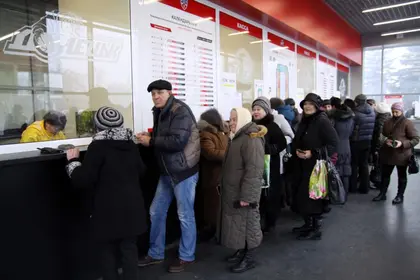“For
the fourth day our humanitarian shipments have not been allowed by various
battalions to enter the territory of the anti-terrorist operation,” Rymma Fil, coordinator
for the Rinat Akhmetov Foundation, said on Dec. 17.
With
many shops and supermarkets having closed in areas of the Donbas controlled by
Russia-supported separatists, residents in some areas have become dependent on
aid shipments from Russia and Ukraine. Now leaders of volunteer military battalions
are refusing to let convoys through the checkpoints they control and allege
that humanitarian aid is being used in occupied territories for commercial
purposes and is a tool for financing the insurgents’ war effort.
JOIN US ON TELEGRAM
Follow our coverage of the war on the @Kyivpost_official.
At
the same time, they are being accused of using humanitarian aid as a bargaining
chip to force separatists to release Ukrainian prisoners. Ukrainian forces have
fewer prisoners than the separatists, making it hard for Ukraine to find enough
people to trade in prisoner exchanges.
“No
humanitarian convoys are going to the terrorists until our prisoners are
released. The Donbas Battalion will see to it in Luhansk Oblast,” said former
Donbas Battalion commander and current member of parliament Semen Semenchenko
via Facebook.
On
Dec. 15 Semenchenko and fellow member of parliament Volodymyr Parasyuk posted
on Facebook that they had visited one of the checkpoints where the trucks were
being turned back, and inspected the cargo. They say they found alcohol and
camouflage in some of the trucks.
The
foundation denied that their transports were carrying the goods and warns that
many people depend on their regular shipments of food.
“In
our transports there has never been anything but food and sometimes diapers but
you can hardly confuse that with vodka and camouflage,” said Fil.
Semenchenko said by phone he had never claimed that the
trucks containing vodka belonged to the Akhmetov Foundation but only said that
alcohol was being smuggled into separatist republics. He suggested passing a
law prohibiting trade with occupied territories.
“It’s a famous rhetorical method when someone is quoted as
saying something he didn’t say,” Semenchenko said. “And then this alleged quote
is ‘exposed’.”
The
events have garnered international concern with US ambassador to Ukraine
Geoffrey Pyatt tweeting that “all legitimate humanitarian aid must be allowed
to reach civilian victims of Russian aggression in Donbas.”
He
said the Cabinet deemed Akhmetov’s aid as legitimate, and also called on “other wealthy Ukrainian
individuals” to “lend their efforts and resources to help these innocent
victims.”
A United Nations report released
Dec. 15 warned that more than five million people living in areas controlled by
Kremlin-backed insurgents are facing a life or death struggle, and that the
situation was worsening by the day as winter set in. The UN slammed the
government for withdrawing public financing for people living in those areas,
which made people more dependent on humanitarian aid.
Battalion
commanders have said they turned back some 40 trucks. The Rinat Akhmetov
Foundation later denied the information, saying that 21 of its trucks had been
turned back on their way to areas of the Donbas controlled by Russia-supported
separatists.
Explaining the controversy
with the number of trucks, Semenchenko said that 40 trucks had been inspected
on Dec. 16 and another 21 three days ago. Akhmetov’s foundation belongs to billionaire Rinat Akhmetov, a native of
Donetsk. The foundation operates distribution points throughout the region
where pensioners and families with young children can receive basic foodstuffs
free of charge.
Semenchenko,
however, doubted these supplies were really needed and on Dec. 17 said there
was currently no humanitarian crisis in Donbas at a briefing at the Ukrainian
Crisis Media Center.
He
has also alleged that supermarkets in Donbas such as Brusnychka and Amstor are
actually buying foodstuff disguised as aid to stock their stores.
Ukrainskiy
Retail LLC, which develops supermarket chain Brusnychka, denied that cargo
belonging to the Rinat Akhmetov Foundation was meant for sale in Brusnychka
stores according Interfax-Ukraine on Dec. 17.
Semenchenko
said by phone that he was not against humanitarian aid but added that
humanitarian convoys should be under government or U.N. control.
Commenting on Akhmetov Foundation aid, he said that “business
and PR stunts shouldn’t be construed as helping people in need.”
In
the meantime, Russia announced its own 10th “humanitarian convoy”
destined for Ukraine. The Russian trucks are not recognized as legitimate aid
by international organizations, and their shipments are not supervised or
checked at the border.
Oleksiy
Matsuka, a journalist from Donetsk, reported in November that one of the
Russian trucks overturned in Donetsk, revealing ammunition inside. OSCE
monitors said fuel trucks have been spotted within the Russian convoy.
You can also highlight the text and press Ctrl + Enter




